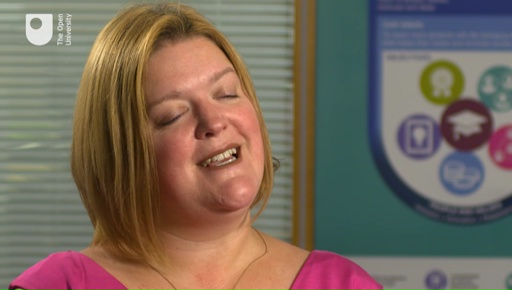1.2 Developing self-esteem
In Week 5, you explored self-esteem and self-efficacy and their role in career resilience. In Activity 1 that week, you looked at how people with high self-efficacy (strong belief in their ability to achieve their goals) might talk to themselves.
Some people think of self-esteem as their inner voice, and adapting that voice to become more positive can make a big difference. This is sometimes known as positive self-talk.
Watch this short video by PsychHub to find out more.
Positive self-talk [Tip: hold Ctrl and click a link to open it in a new tab. (Hide tip)] (make sure to open the link in a new tab/window)
How do you talk to yourself when things go adrift? Are you harsher on yourself than you would be on others?
Developing your self-esteem is all about controlling your self-talk and changing the narrative from negative to positive. For example, if you tend to tell yourself ‘I can’t go for that job, I’m not clever enough’, a positive change in your internal dialogue might be ‘I wonder what qualifications and experience the employer is looking for’. If, on further analysis, you find that you don’t have the required qualifications – you could explore how to obtain them and consider possible next steps towards applying for a similar job in the future.
Watch this short video in which Rebecca Fielding, Managing Director at Gradconsult, and a highly experienced leader in recruitment and talent management for some of the UK’s biggest names, speaks about how highly resilient people behave when things go wrong, She also talks about how she boosts her own self-esteem.

Transcript: Video 2 What to do when things go wrong
Activity 2 Boosting your own self-esteem
Thinking about what you just heard from Rebecca about positive and negative self-talk, try this activity, adapted from an exercise recommended by the NHS (2018).
- Step 1 – Identify any negative beliefs you have about yourself, or negative things you regularly tell yourself, and make a note of them. For example, you might tell yourself you're ‘too stupid’ to apply for a new job, or that ‘nobody cares’ about you.
- Step 2 – Think of some evidence that challenges these negative beliefs and write that down too, such as, ‘I'm really good at cryptic crosswords’ or ‘My sister calls for a chat every week’.
- Step 3 – Now write down other positive things about yourself, such as ‘I'm thoughtful’ or ‘I'm a great cook’ or ‘I'm someone that others trust’.
- Step 4 – Finally, write some good things that other people say about you. If you can’t think of anything, take a moment to ask someone you trust and respect what they like about you, and then come back to the task.
- Step 5 – Create a list of at least 5 positive things about yourself, then put your list somewhere you can see it.
Discussion
Try to make this a habit and add to your list regularly. By regularly looking at your list, you’ll keep reminding yourself that you are ok, and this will gradually start to make a difference.
Keeping your self-esteem high
If you are going through times of transition in the workplace, such as your first weeks as a line manager or conflict with a colleague, it can be hard to keep self-esteem high.
The NHS (2018) offers the following simple techniques for boosting your self-esteem:
- recognising what you’re good at and celebrating it
- building positive relationships with people who appreciate you
- being kind to yourself at times when you feel like being self-critical – think what you’d say to a friend in a similar situation
- learning to be more assertive – respect other people’s opinions and needs and expect the same from them. Look at people who act assertively and try and copy what they do
- saying no – don’t feel you have to always say yes to other people
- setting yourself a challenge or goal (such as the one you came up with in Activity 4, in Week 5)
Bear in mind, too, that you don’t have to do this alone. Counsellors can help unpick where and why you are being harsh on yourself – your GP surgery can give referrals.
Which of these tips might make the biggest difference for you? How could you build it in so it becomes part of your routine, like Rebecca Fielding does on her drive home?

